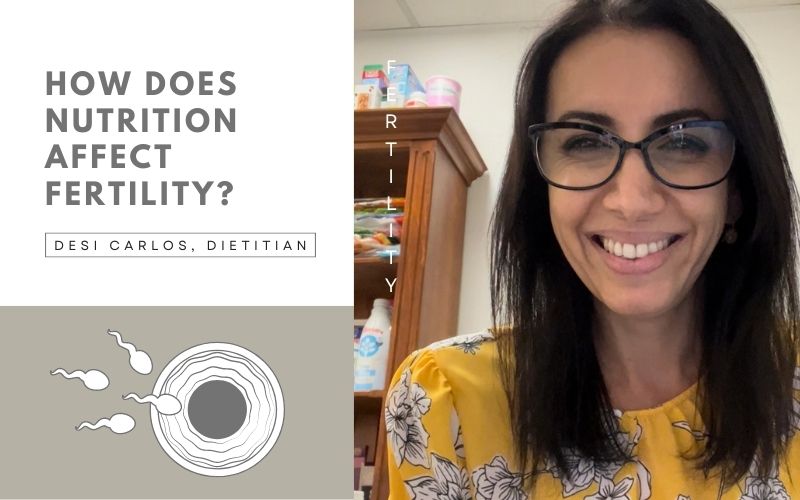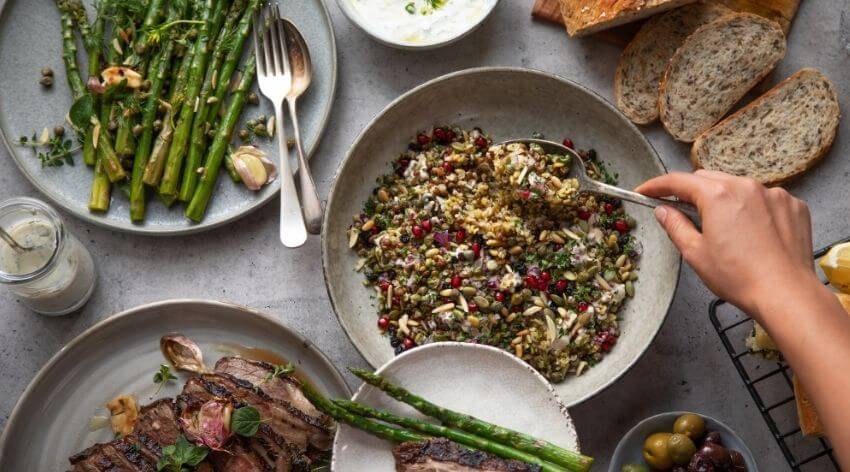
How does nutrition affect fertility? You wouldn’t necessarily relate what we eat with our reproductive health, but like many things in our bodies, there is a connection. There is strong evidence that diet and adequate nutrition have a beneficial effect on fertility, for both men and women. If you’ve been trying to get pregnant for a while, you may feel that so much of the process is out of your control. And while it’s important to relax, it’s great to know that there are things that you can do to optimise your chances of having a baby. One of which, is definitely to eat well for preconception. As a fertility specialist dietitian, I help you optimise sperm and egg health with the right nutrients.
So how does nutrition affect fertility, does it really make much of a difference?
Over the last 10 years or so, there have been some fairly major studies on fertility and the role nutrition can play. Poor nutrition has been linked to infertility. Both in hormonal production and egg health in women, and also in the health of sperm. Of course, I can also attest to this in the clinic too.
So as a support to your current fertility treatment, or perhaps as a first port of call if you’ve just started trying for a baby, it is well worth getting your diet in order. At a base level, eating more plants, eating less processed foods and chemicals, getting regular exercise and sleep and lowering stress makes for a quality diet and lifestyle for anyone of any age. And this is particularly true for you if you’re trying to get pregnant.
Infertility facts
In Australia, approximately 1 in 9 couples experience fertility problems. While we often associate infertility with women, in fact, it is evenly apportioned.
- Female infertility 2 in 5 cases.
- Male infertility 2 in 5 cases
- Unexplained or from combined factors 1 in 5 cases.
Optimising sperm health
How does nutrition affect fertility in men? Poor nutrition can contribute to sperm health decline. Results from a global study on sperm health, show that sperm health has declined over the past 40 years by 50-60% worldwide. Lifestyle was found to play a “crucial role in maintaining proper reproductive functions.” Here are the seven factors have been associated with low sperm quality:
- Excessive alcohol consumption
- Oxidative stress
- Pollution
- Sedentary lifestyle
- Pesticides
- Radiation
- Poor diet
The good news is, eating well improves sperm quality. A study of 250 men who had sperm analysed at a fertility clinic showed that men who ate more fruits and veggies, especially green veggies and legumes had higher sperm concentrations and better sperm motility.
Nutrition and female fertility
So how does nutrition affect fertility in women? A nutritious, well balanced diet helps to encourage good hormonal function. When our hormones are working well, then this ensures regular ovulation.
Good nutrition also supports the development of healthy eggs. It does this in three important ways:
- Providing the necessary nutrients for cell upkeep.
- Reducing inflammation.
- Decreasing oxidative stress (an imbalance of antioxidants and free radicals)
How can both sexes boost fertility?
When it comes to boosting our fertility, I have some great tips in the video below. While they won’t replace specialised dietary advice, I hope you find them helpful.
Good fertility nutrition is not just about ‘superfoods.’
Oh if that were that easy! Good nutrition for fertility (or any time really) is all about what we don’t eat so much of, as well as what we do. As a general reminder, here are some of the main things we can do with diet that can help boost fertility in both men and women.
- Avoid chemicals. This includes those commonly used in the growing process, like pesticides, as well as those used to process them. Swap processed foods for natural foods and those that are minimally processed!
- Eat more plant-based foods. Enrich your day to day meals with more fruits, vegetables, legumes, nuts and seeds.
- Avoid saturated fat and sugar. Fast food often has both (yes even the savoury foods often have sugar!)
- Maintain a healthy weight. Being overweight can impact fertility in both sexes. On the flipside, being underweight can also disrupt ovulation.
- Check your nutrient levels. You may need to optimise nutrient levels either with supplements or vitamin-rich foods.
Fertility nutrition is not just for preconception
When you’re making a baby, it’s important to consider boosting your chances of falling pregnant, sure. But good nutrition is also much more than that. It’s about giving that baby the very best nutrients when you do conceive, right from the start. Once you’re pregnant, good nutrition is more important than ever. The composition of your diet and your nutrient levels during pregnancy all lay down the building blocks for your child’s metabolic future. Gulp, no pressure ladies!
The nutrient-dense Mediterranean Diet is a leading fertility diet
A diet based on the Mediterranean dietary patterns, has been shown to have a positive impact on fertility. The Mediterranean Diet has the correct balance of macronutrients, is high in plant-based protein, high in dietary fibre and omega-3 fatty acids. It is also naturally rich in the micronutrients necessary for reproductive health and to support the developing foetus. What’s more, the Mediterranean Diet is lower in sugar, refined carbohydrates, and trans or saturated fats and sugar, which have been linked to infertility.

Wishing you all the best
I wish you all the very best on this journey of growing your family. I know it isn’t always easy for everyone. But I really believe in the power of nutrition in preparing you for conception, and for helping to optimise the health of your baby too. If you need additional fertility nutrition advice in the Brisbane area, please reach out to make an appointment.
Together, we can work through your current diet and lifestyle to determine any issues that may be impacting fertility, including nutritional deficiencies. We can also discuss nutritional support for underlying health issues that may increase your risk of infertility, such as obesity, PCOS, IBS, IBD or endometriosis.
Get fertility nutrition tips in a handy reference guide
I’d love to offer you some information on boosting fertility to be able to print out and use (and even give to your partner). Find out what you need to eat and what you shouldn’t eat to optimise sperm and egg health. This is the information I’d usually give my patients, and I’m offering it to you for free in a cheat sheet for fertility nutrition. If you’d like a copy, it’s yours for free right now by subscribing to our email list.
DISCLAIMER:
The content in this article is not intended as medical advice. It is also of a general nature and is not based on your individual circumstances. If you are experiencing significant fertility problems, a 1:1 consultation is always the best approach as well as consultation with a fertility doctor. Please contact our clinic to discuss your unique situation and our tailored and individualised approach to fertility nutrition.

